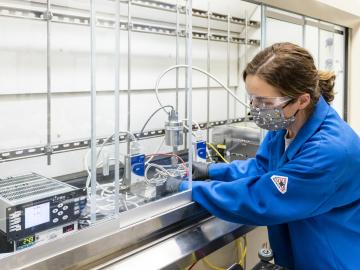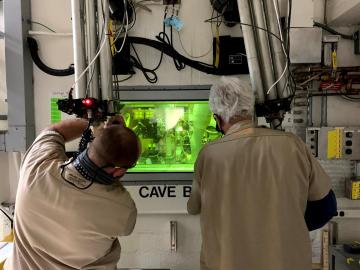
Filter News
Area of Research
- Advanced Manufacturing (10)
- Biology and Environment (37)
- Computer Science (1)
- Energy Science (83)
- Fusion and Fission (28)
- Fusion Energy (8)
- Isotope Development and Production (1)
- Isotopes (24)
- Materials (40)
- Materials for Computing (4)
- National Security (21)
- Neutron Science (13)
- Nuclear Science and Technology (20)
- Quantum information Science (1)
- Supercomputing (42)
News Type
News Topics
- (-) 3-D Printing/Advanced Manufacturing (104)
- (-) Advanced Reactors (24)
- (-) Biotechnology (35)
- (-) Buildings (45)
- (-) Clean Water (18)
- (-) Composites (23)
- (-) Cybersecurity (31)
- (-) Exascale Computing (64)
- (-) Fusion (54)
- (-) Isotopes (53)
- (-) Space Exploration (16)
- Artificial Intelligence (112)
- Big Data (53)
- Bioenergy (93)
- Biology (106)
- Biomedical (59)
- Chemical Sciences (70)
- Computer Science (174)
- Coronavirus (36)
- Critical Materials (16)
- Education (5)
- Element Discovery (1)
- Emergency (3)
- Energy Storage (75)
- Environment (154)
- Fossil Energy (7)
- Frontier (60)
- Grid (48)
- High-Performance Computing (113)
- Hydropower (6)
- ITER (6)
- Machine Learning (50)
- Materials (111)
- Materials Science (111)
- Mathematics (8)
- Mercury (9)
- Microelectronics (4)
- Microscopy (40)
- Molten Salt (5)
- Nanotechnology (46)
- National Security (78)
- Neutron Science (136)
- Nuclear Energy (94)
- Partnerships (67)
- Physics (60)
- Polymers (22)
- Quantum Computing (48)
- Quantum Science (79)
- Security (28)
- Simulation (52)
- Software (1)
- Statistics (3)
- Summit (62)
- Transportation (56)
Media Contacts

For years Brenda Smith found fulfillment working with nuclear batteries, a topic she’s been researching as a chemist at Oak Ridge National Laboratory.

A rare isotope in high demand for treating cancer is now more available to pharmaceutical companies developing and testing new drugs.

A new method developed at Oak Ridge National Laboratory proves one effort’s trash is another’s valuable isotope. One of the byproducts of the lab’s national plutonium-238 production program is promethium-147, a rare isotope used in nuclear batteries and to measure the thickness of materials.

Xin Sun has been selected as the associate laboratory director for the Energy Science and Technology Directorate, or ESTD, at the Department of Energy’s Oak Ridge National Laboratory.

Twenty-seven ORNL researchers Zoomed into 11 middle schools across Tennessee during the annual Engineers Week in February. East Tennessee schools throughout Oak Ridge and Roane, Sevier, Blount and Loudon counties participated, with three West Tennessee schools joining in.

Balendra Sutharshan, deputy associate laboratory director for operational systems at DOE’s Pacific Northwest National Laboratory, has joined ORNL as associate laboratory director for the Isotope Science and Engineering Directorate.

On Feb. 18, the world will be watching as NASA’s Perseverance rover makes its final descent into Jezero Crater on the surface of Mars. Mars 2020 is the first NASA mission that uses plutonium-238 produced at the Department of Energy’s Oak Ridge National Laboratory.

From the helm of a one-of-a-kind organization that brings nuclear fusion and fission expertise together to pave the way to expanding carbon-free energy, Kathy McCarthy can trace the first step of her engineering career back to

Thirty-two Oak Ridge National Laboratory employees were named among teams recognized by former DOE Secretary Dan Brouillette with Secretary’s Honor Awards as he completed his term. Four teams received new awards that reflect DOE responses to the coronavirus pandemic.

Three technologies developed by ORNL researchers have won National Technology Transfer Awards from the Federal Laboratory Consortium. One of the awards went to a team that adapted melt-blowing capabilities at DOE’s Carbon Fiber Technology Facility to enable the production of filter material for N95 masks in the fight against COVID-19.


